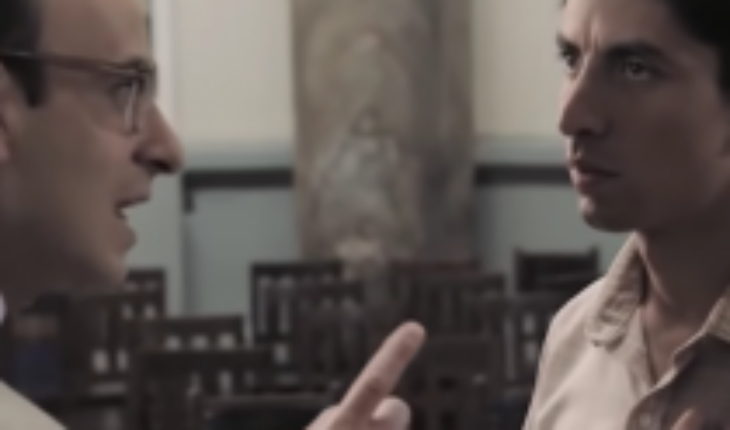The battle for cultural hegemony, says the Spanish intellectual Carlos Fernández Liria in a text where he interprets the thought of the philosopher Antonio Gramsci, is a “laborious trench warfare, but it takes place on a discursive plane.” In this sense, he explains, what is involved is that the opposing parties find signifiers, empty or ambiguous forms or terms (such as “homeland”, “freedom” or “progress”) that can be filled or fitted with meanings, ideas or feelings that impregnate the environment with discomfort or illusion (for example, the idea of Rejection about a “refoundation of the country”, of “destroying Chile by dividing it into multiple nations” or of “disrespect or betrayal of the emblems that represent the nation”). The more or less intelligent choice of those signifiers or signs would allow, consequently, to build a popular identity on which one can claim, with greater or lesser success in the end, a universal legitimacy.
Fernández makes it clear, finally, that the crusade for cultural hegemony is not fictitious: it consists of the construction of stories, myths, stories and, finally, fictions, among which the “fiction of a general interest” may be the most important.
From this can be drawn several lessons, if not forgotten teachings by the centre-left and, in general, by the movements and social agents that adhered to the option of approving the proposal for a new constitution of the Convention. They, possibly confident, some politically worn out by the contingent issues affecting the government they support (a young and novice government, by the way), or too idealistic or romantic, thought they could simply persuade the electorate on the basis of those deep convictions that move them, forgetting how they could communicate these in small shocking sequences that would bring them together in a single simple and expressive plot along with:
The look of social interests that emerged with the social explosion.
The secularized beliefs of the Chilean population.
The contingent needs and fears that can be instilled on the basis of these.
In this the option of Rejection worked, perhaps, with a fierce strategic sense at the same time as successful. First of all, he guarded himself from incurring triumphalism, which earned him a modest appearance. Second, it was also kept from self-centeredness, to the point that the political actors of the right made themselves invisible at key moments of the campaign, the closing act and even when it was necessary to give the first impressions about the triumph. Third, it spurred the emotionality of 60% of the electorate by resorting to intransigible cultural codes of Chilean society and, in addition, to fictions or suggestions about how the average Chilean should interpret their daily reality. All this was promoted with the most ingenious emotional marketing – and perhaps by the hand of the best consultants or advertising agencies – whose deployment we could summarize in this way:
The induction in the population of a feeling of urgency or calamitous in relation to the future of public security and the national economy, issues that due to their contingency could have as much or more importance than the social claims of the outbreak. (This would be called the “principle of exaggeration and disfigurement” in a scandalous document of the Jaime Guzmán Foundation regarding political communication aimed at young people, published ten years ago in this medium and in the Diario de la Universidad de Chile).
The induction of a feeling of threat of fragmentation in the medium term of Chile. According to the Rejection, if the proposal for a new constitution of the Convention had been approved, there would be, on the one hand, a predominant ethnic group (that of the common and wild Chilean) and soon also “some Chileans X”, others “Y” and others “Z” who would have their own rules and demands for justice and power within the territory. (This would be called the “principle of simplification and the one enemy” in the document mentioned.)
The impression on the retina of an atmosphere of contempt for what would make us essentially Chileans and that, when asked by a journalist, any national could hastily reduce to patriotic symbols such as the flag (which was the object of an act of sodomy by a faction of the Apruebo), the shield and the national anthem. The latter is perhaps the most cleverly worked element through a moving musical performance in the television campaignthe Rejection, which took us back to the school ceremonies of childhood or to the most emblematic duels of the Chilean football team, for example. (“Principle of vulgarization.”)
The marginalization of the “hated” political class, which in reality remained behind or hid behind a citizen reference as unknown as many conventional elected after the outbreak were in their minute. I am referring, of course, to the spokesman of the Citizen House for Rejection, Claudio Salinas, who can be conceived as playing the role of any child of a neighbor, employee or entrepreneur, apparently without affiliation or political interest and committed to his neighborhood or nation.
The incorporation of some dissidents from the enemy ranks of the Apruebo (such as Felipe Harboe or Ximena Rincón), which aroused the effect of an interest of the Rejection for the unity of the entire political sphere and, with it, of the Chilean people.
The intellectual “foundation” and elegantization of the discourse of Rejection through the recruitment of an academic with a certain prestige and fame, who, although he is a supporter of a new constitution, was unable to accept that of the Convention, actively and systematically rejecting it. I am referring to Cristian Warnken, who even led a movement as media as Amarillos por Chile has been until here. (“Principle of plausibility.”)
An accurate reading of an electorate that usually does not exercise its right to vote. This segment of the population could even have reluctantly turned out to vote, endorsing the responsibility for the obligatory nature of the plebiscite to a government that promoted informed voting, that “threatened” together with the Servel with significant fines (which only aggravate the inflationary scenario) and which could also be accused of interventionism.
Many of these successful strategies of hegemonization did not occur in the other side (that of the Apruebo), so we should humbly take note of them, not to disguise an interest or cheat votes, but to prevent precisely these traps and enhance one’s own discourse. And to do so not only in the campaign of a potential next plebiscite ratifying a new constitutional proposal, but also in persuasion ex ante of the universe of actors who will intervene in the development of it.
Finally, there is some truth in the aesthetics of Jaime Guzmán, the ideologue of the Constitution of 80, portrayed in the popular series 12 days that shook Chile (Chilevisión). There this lawyer and politician of the UDI, after being accused by his student of elaborating a magna carta based on blood, claims something that, although it is not in any way an absolute truth, deserves consideration, in the understanding that, as human beings, our rationality does not respond only to arguments or philosophical presuppositions left-handed millimetrically, but also to impressions and emotions that complement them and that, in any case, can even usurp them. Guzmán says there, raising the index and frowning with darkness, after despising the fact that the student concentrates discursively only on the project of society that he defends without attending to earthly issues:
“A country is not a piece of land. It is not the people who govern it, not even its people. A country is its laws, it is its ‘beliefs’. People die, but systems live. Countries live. So you know what? Keep fighting as much as you want. Put on your hood! Keep shouting your slogans for the Alameda! Keep fighting a war that no one else [le] Understand! But do you know what’s going to happen? Mrs. Norma [o Juanita] he’s still going to choose the candidate who finally gives him a chicken on Sunday.”
The student replies at the end, with a sorrowful voice and shaking his head that simplification of the human: “That is almsgiving. That’s misery.” In this way, the supporters of the Apruebo, who seemed to embody par excellence the project of a new constitution, will have to take care of more than those signs of urgency (which also respond to the “principle of orchestration” [de ideas o ficciones repetidas hasta el cansancio]), which threaten the daily survival of the Chilean citizen, do not impose themselves in the discourse next time, postponing for more years the needs that historically have been overcome with injustice and that they aspire to overcome at last by means of a new Magna Carta. All this considering, in addition, the transposition effect that has occurred (and that responds to the principle of political communication of the same name): because to the extent that the Approve promoted a failed constitutional proposal, its proselytes (and not those of the Rejection) become the appearance of being the only culprits that the Social crisis has no solution yet (even if in the Rejection there are many who have rejected a priori without anything in hand, seeing in this, from the beginning, a mere political game for the conservation of Pinochet’s constitution).
Follow us on
The content expressed in this opinion column is the sole responsibility of its author, and does not necessarily reflect the editorial line or position of El Mostrador.





